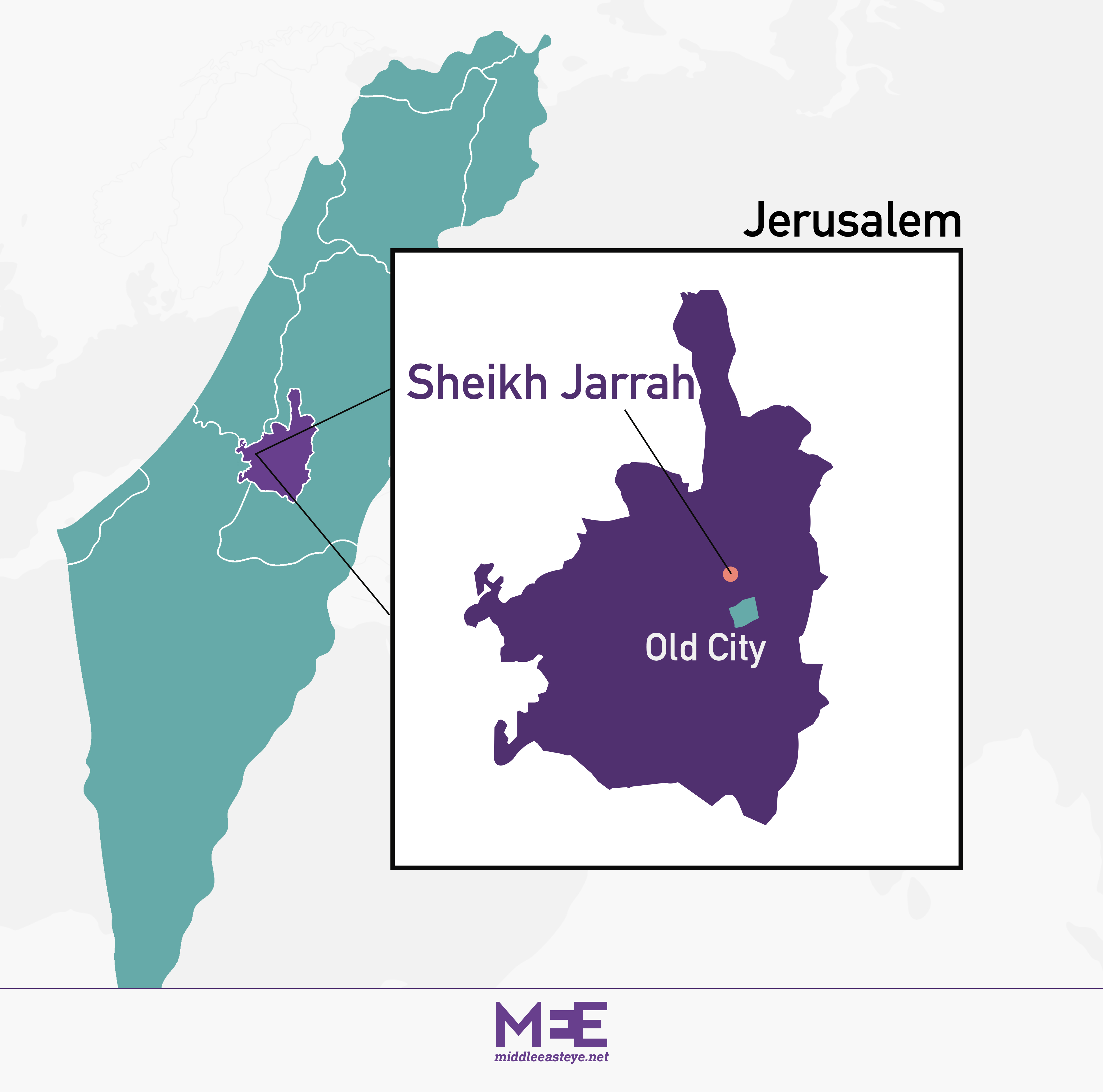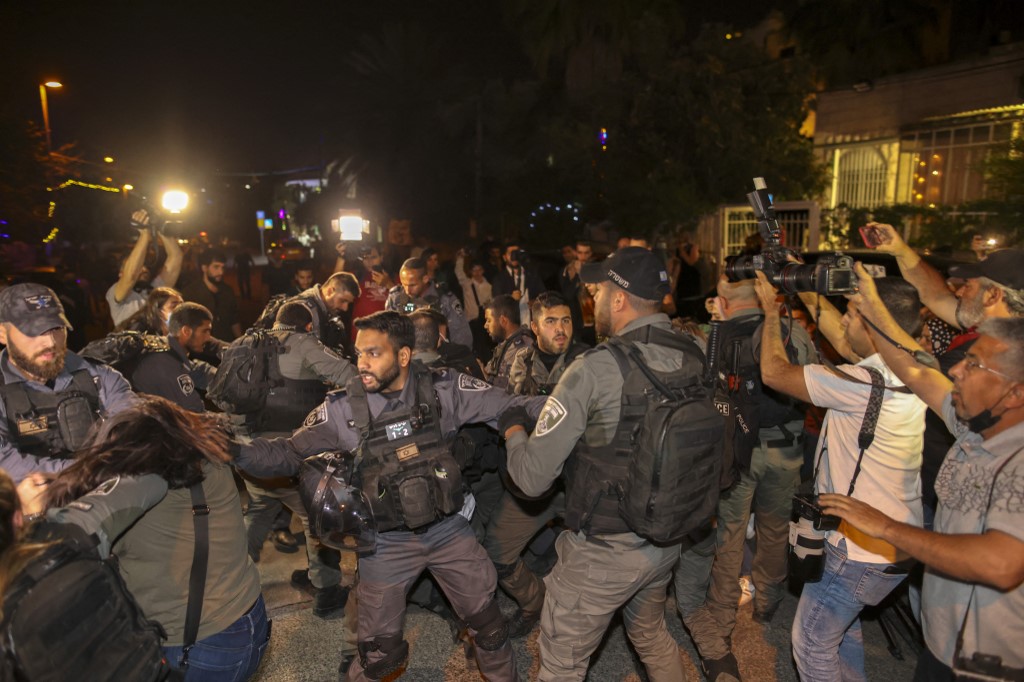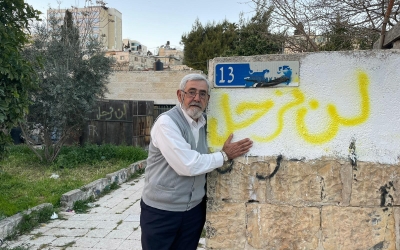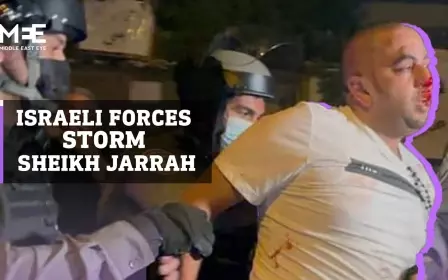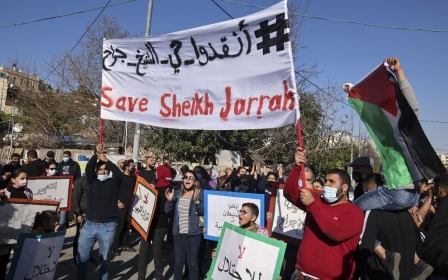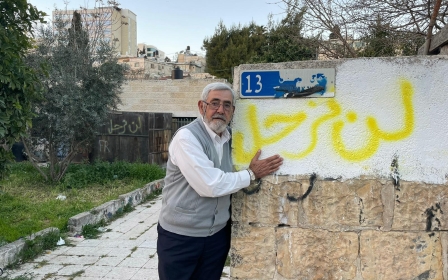Sheikh Jarrah: Israeli police storm Palestinian protest over Jerusalem evictions
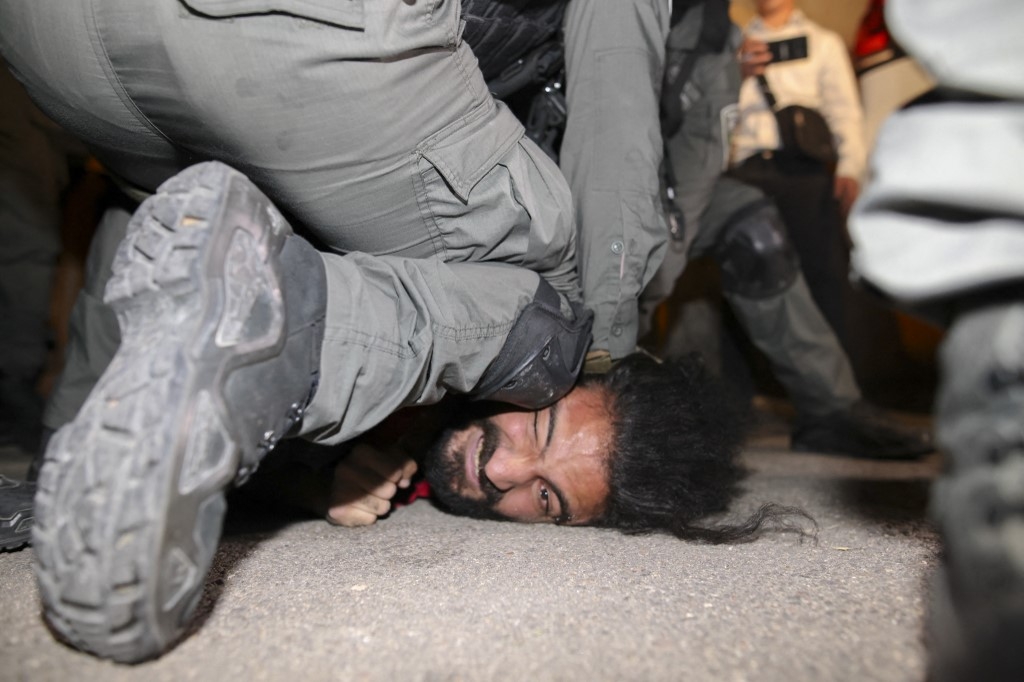
Israeli military police stormed Palestinian houses in the Sheikh Jarrah neighbourhood of occupied East Jerusalem on Tuesday evening, attacking activists taking part in a sit-in solidarity protest with residents facing imminent eviction.
Three Palestinians were arrested and six injured, local sources told Middle East Eye. The Red Crescent reported that two Palestinians had been hospitalised.
Since the beginning of 2020, Israeli courts have ordered the eviction of 13 Palestinian families in Sheikh Jarrah, a residential area less than a kilometre away from the walls of the Old City of Jerusalem.
Muna al-Kurd, who was attacked on Tuesday evening, told MEE that if Israeli police and settlers take over their houses, “then they will take the whole neighbourhood of Sheikh Jarrah".
'The police attacked the residents and activists who were there in solidarity with us. They brutally beat everyone with batons, sprayed skunk water and dispersed people with mounted horses'
- Abdel Fattah Iskafi, resident
Kurd, whose brother Mahmoud owns one of the houses and was among those arrested, called for international and Palestinian activists to stop the eviction and stand against the Israeli settlers and police.
On Sunday, Israel’s Supreme Court ordered that the Iskafi, Kurd, Jaouni and Qasim families - consisting of 30 adults and 10 children - evacuate their homes by 6 May.
The court gave the Hammad, Dagani and Daoudi families living in the same area until 1 August to evacuate.
Abdel Fattah Iskafi told MEE that his family had lived in their home for decades.
“Israeli special forces besieged Sheikh Jarrah in the evening and didn't allow anyone from outside, especially the solidarity activists, to enter it," he explained.
"This was after the iftar of Ramadan. There were dozens of police and special forces, at least 60 of them, more than the whole population of Sheikh Jarrah."
Despite the tight military cordon around the neighbourhood, activists managed to find routes to reach the houses in the area.
“At about 11pm, the police attacked the residents and the activists who were there in solidarity with us. They brutally beat everyone with batons, sprayed skunk water and dispersed people with mounted horses,” Iskafi said.
Iskafi, who lives with 14 members of his extended family, including his children and grandchildren, confirmed that they would remain in Sheikh Jarrah despite the Supreme Court order.
“We are not going to leave our home, we will remain until the last breath. No one can take away my memories and my heart from my home. We are not going to move anywhere and despite the stress and tough conditions, we are trying to continue our normal daily routine here,” Iskafi told MEE.
Iskafi is one of the Palestinian families living in homes built in Sheikh Jarrah in 1956 with the approval of the UN agency for Palestinian refugees (UNRWA) and the Jordanian authorities who ruled the West Bank and East Jerusalem from 1948 until 1967, when Israel captured them.
Since Israel seized East Jerusalem in the 1967 war, Israeli settler organisations have claimed ownership of the land in Sheikh Jarrah and have filed multiple successful lawsuits to evict Palestinians from the neighbourhood since 1972.
In 2002, 43 Palestinians were evicted from the area and Israeli settlers took over their properties. In 2008, the Hanoun and Ghawi families were evicted and in 2017 the Shamasneh family was removed from their home by Israeli settlers.
Aref Hammad, whose family is facing eviction, and is head of the Sheikh Jarrah neighbourhood committee, told MEE that Israeli settlers were pushing the Palestinian residents to recognise "their ownership of the land".
“They want to make us the tenants, but this will never happen… they own nothing and we have legal documents to prove that," said Hammad, whose family has lived in the house since 1957.
'A political decision'
In April, Jordanian Foreign Minister Ayman Safadi visited Ramallah in the occupied West Bank to meet Palestinian Authority officials and hand over documents proving Palestinian ownership of their properties in Sheikh Jarrah, in a bid to prevent a new mass eviction.
"All the documents we hold on property and land in Jerusalem have been passed on to the Palestinian Authority," Safadi said at the time, adding that his government "found the documents proving that the [Jordanian] Ministry of Development that built these houses had in 1956 finalised lease agreements for homes in Sheikh Jarrah."
Palestinians in Sheikh Jarrah are families who were expelled by Zionist militias from Arab towns and cities which became part of Israel following the 1948 war.
“There is a political decision behind the eviction of Palestinians from Sheikh Jarrah," Hammad said. "Israel has a grand strategy to connect East and West Jerusalem, and to remove Palestinians from areas surrounding the Old City of Jerusalem to create the so-called Holy Basin, and to build 220 settler units in the area."
Hammad has no faith in the Israeli Supreme Court.
“Oh, they have never issued a single decision in our favour. I have no high expectation from them,” he said.
“But we hope that European Union countries who have relations with Israel take action and put pressure on Israel to stop this crime against the locals here."
In December, the EU issued a statement opposing Israel’s plan to “put all families at imminent risk of forced transfer”.
“Israeli domestic laws, creating the basis for the claims to evict the families, do not exempt Israel, as the occupying power, from meeting its obligations to administer the occupied territory in a manner that provides for and protects the local population. Israel has not acquired sovereignty over the territory in the course of its administration,” the EU said, followed by another statement in March.
Israel has illegally occupied the West Bank and East Jerusalem, including the Sheikh Jarrah neighbourhood and the Old City of Jerusalem, since the 1967 war.
The latest evictions come as Jerusalem has seen heightened tensions in recent weeks, with far-right Israelis staging marches calling for "Death to Arabs" amid longstanding efforts by Israeli authorities to expand settlements - which are illegal under international law - in East Jerusalem.
Middle East Eye propose une couverture et une analyse indépendantes et incomparables du Moyen-Orient, de l’Afrique du Nord et d’autres régions du monde. Pour en savoir plus sur la reprise de ce contenu et les frais qui s’appliquent, veuillez remplir ce formulaire [en anglais]. Pour en savoir plus sur MEE, cliquez ici [en anglais].


